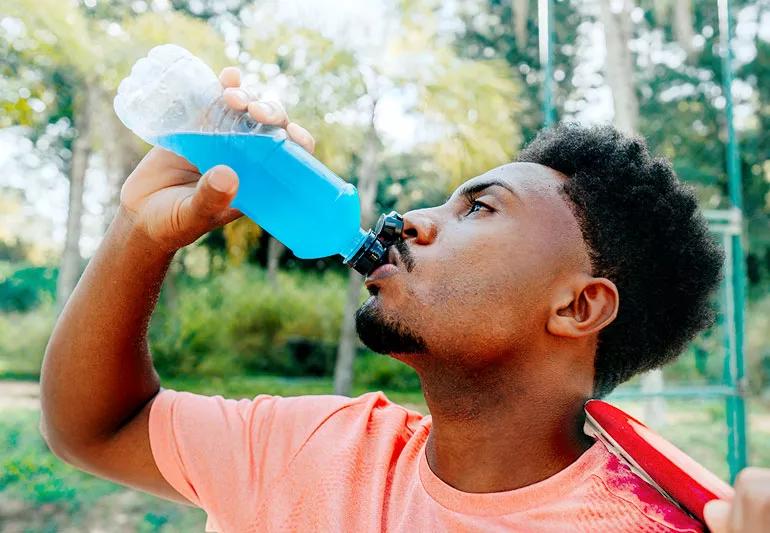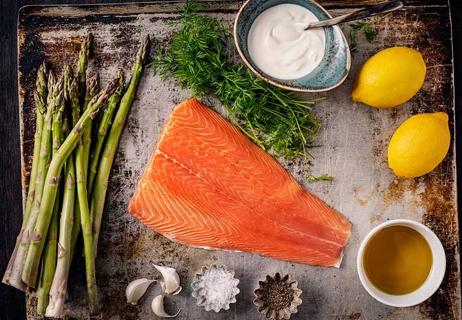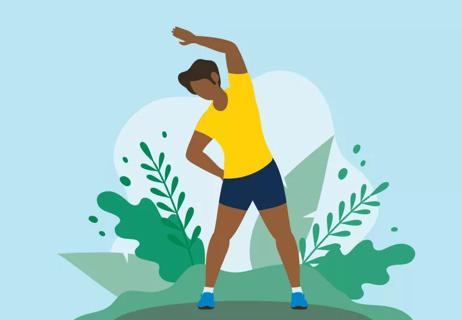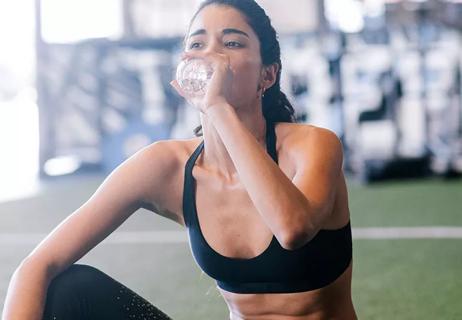Sports drinks are best when needed — and that’s not all the time

Your body needs electrolytes. These amazing substances help your body function in numerous ways. They work to maintain fluid balances. They turn nutrients into energy. They support muscle control and heart rhythm.
Advertisement
Cleveland Clinic is a non-profit academic medical center. Advertising on our site helps support our mission. We do not endorse non-Cleveland Clinic products or services. Policy
It’s an impressive resume of health-related awesomeness — which explains why electrolyte-enhanced drinks are so popular, especially among the fitness crowd.
So, if electrolytes are that fabulous, more would be better for you … right? Not exactly, says registered dietitian Julia Zumpano, RD, LD. Here’s why too much of a good thing can be problematic.
Video content: This video is available to watch online.
View video online (https://cdnapisec.kaltura.com/p/2207941/sp/220794100/playManifest/entryId/1_v5p4oag2/flavorId/1_5f3sgelj/format/url/protocol/https/a.mp4)
There’s a long scientific explanation for what electrolytes do — but at the most basic level, the job focuses on one primary thing: Maintaining balance in your body.
We typically think of an electrolyte imbalance as meaning you’re low on them. In fairness, that’s how electrolyte-enhanced products such as sports drinks are marketed. The whole idea behind them is to replenish depleted reserves.
That’s why electrolyte products are high in sodium, potassium, chloride, magnesium, phosphate and other key electrolyte-boosting elements. It’s all about resupplying your body.
But electrolyte imbalances can be on the high side, too, and that brings its own set of problems.
“An imbalance of electrolytes can occur when the concentration is too high for your body — specifically, your kidneys and hormones — to regulate,” explains Zumpano. “Any of the elements in excess can lead to negative health outcomes and harmful effects.”
Advertisement
Having too much of a particular electrolyte element in your system can lead to symptoms like:
It’s not a good idea to turn electrolyte drinks into your go-to beverage throughout the day. “It’s certainly possible to go overboard with them,” warns Zumpano.
Guzzling a sports drink isn’t the same as sipping water for basic hydration, after all. View electrolyte-enhanced drinks as a specialty product to be used when necessary to replenish your body’s lost resources.
Moments when you might want to consider reaching for an electrolyte drink include:
“Replenishing your electrolytes in those cases will make you immediately feel a little better,” says Zumpano. “Listen to your body and take in what you need — but don’t overdo it.”
Sports drinks can be high in sugar and calories, too — another reason for moderation.
Show some restraint in downing electrolyte drinks even when it’s an ideal time to tip one back. (A warning, too: Electrolyte drinks increase your thirst; therefore, making them easier to drink when compared to water.)
“One or two electrolyte drinks should be enough for most people to reach a safe and healthy balance after you deplete resources,” advises Zumpano. “If you’re still thirsty after that, try to drink water.”
If you struggle drinking plain water because it’s … well, plain, try adding some lemon, lime, mint or cucumber to naturally enhance the flavor.
One more thing to consider when deciding whether you need to randomly crack open a sports drink: You also get electrolyte elements through what you eat.
“Electrolytes are found in a whole slew of foods — and especially in fruits and vegetables,” clarifies Zumpano. “If you’re eating a diet rich in whole foods, you’re going to meet your basic electrolyte needs unless you do something extra [like exercise] and need to replenish.”
Sports drinks can be an effective way to replenish lost electrolytes after a tough workout or sweating during a blistering hot day. But these electrolyte-heavy concoctions aren’t meant to be an all-day drink.
“It’s important to keep your electrolyte levels balanced — and that includes not pushing those levels too high,” says Zumpano. “So, don’t take in what you don’t need.”
Advertisement
Learn more about our editorial process.
Advertisement

Sports drinks and electrolyte-infused waters aren’t the only game in town

What you do in the hours and days after exercise can determine how your body bounces back

This treat from the trees can help replace lost electrolytes

Your diet in the weeks, days and hours ahead of your race can power you to the finish line

Squats are foundational for building strength in your legs, glutes, quads and core muscles

A consistent walking program is an effective way to drop pounds and lose body fat

From playful movement to strength-building, kids need exercise to stay healthy and strong

You can improve your athletic performance over time by breaking up your workout regimen into focused cycles

Wearing a scarf, adjusting your outdoor activities and following your asthma treatment plan can help limit breathing problems

Your diet in the weeks, days and hours ahead of your race can power you to the finish line

When someone guilt trips you, they’re using emotionally manipulative behavior to try to get you to act a certain way